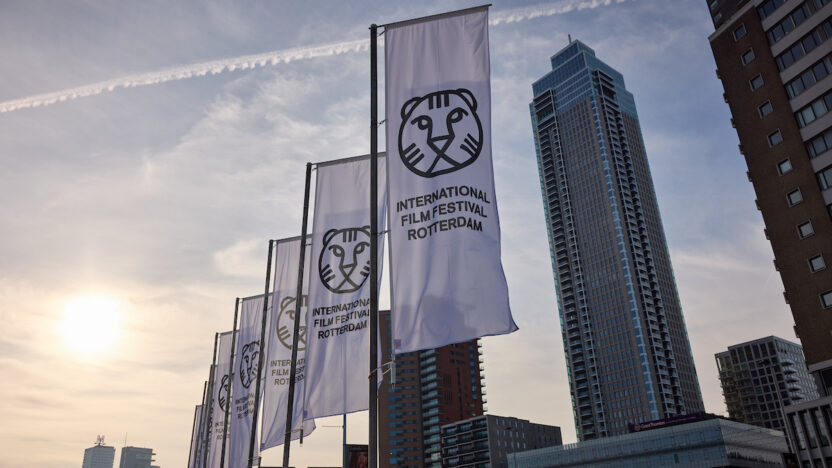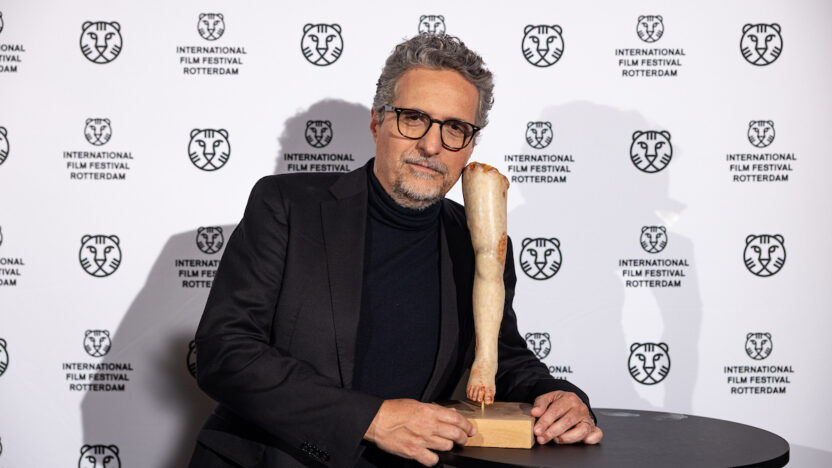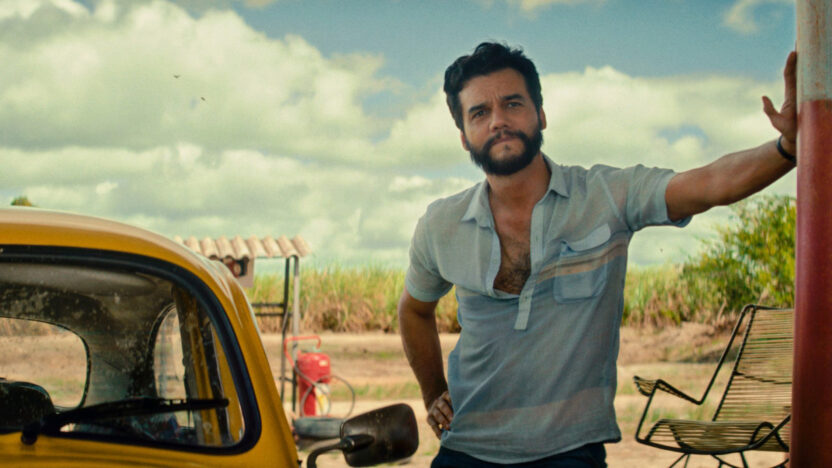CineMart 2025: expanding the frame
From politically charged narratives to genre-defying experiments in immersive media, CineMart 2025 reaffirmed its role as a catalyst – a space where projects find the partnerships they need to take the next leap forward. This year’s selection highlights a wide range of storytelling and genres, including two African women-led projects and a special focus on Georgian filmmakers navigating political and financial pressures. IFFR Pro spoke to a few of the selected projects.

Exploring the transformative power of anger
“Can anger be good? What does it look like when it is? And on the flip side, what does it do to people?” Kenyan filmmaker Angela Wanjiku Wamai presented these questions with her next project, the Hubert Bals Fund-supported Enkop. Wamai pitched her neo-Western during CineMart, a film that sets the story of 55-year-old Lorna Marwa’s fight to reclaim her life on the dusty expanses of Kenya’s volatile ranch land.
“I’m always dealing with themes around freedom and people attempting to find what that means for themselves. I have this obsession with trauma and how people deal with it – not just individually, but across generations. With this project, the story is a lens through which I explore Kenya’s layered history and the profound impact of intergenerational loss.”
“Coming into a space like this, you always have doubts – ‘Is my project good enough?’ But then you hear other filmmakers, and you realise we’re all asking the same questions”
For many filmmakers, CineMart isn’t just about pitching – it’s about building lasting relationships. Whether securing financing, meeting future co-producers or simply exchanging ideas, these interactions often shape a project’s journey long after the festival ends. As Wamai put it: “coming into a space like this, you always have doubts – ‘Is my project good enough?’ But then you hear other filmmakers, and you realise we’re all asking the same questions. It’s really comforting to know you’re not alone.”

Innovation driven by community
CineMart has long been a champion of alternative storytelling formats, and this year was no exception. In the immersive category, Afro-Indigenous Venezuelan filmmaker Jeissy Trompiz’s The Dreams of Time sets out to push the boundaries of VR – blending independent cinema with interactive gaming elements. The project follows Izán, a young archaeologist in Pompeii who, through dream experiments, communicates with the souls of ancient Pompeiians – until they foretell an impending apocalypse.
“For me, it’s really exciting because VR is an entirely new market. It’s a space for innovation, to try ideas that wouldn’t work in traditional formats”
Representing the project at CineMart, producer Matheus Philip reflects on the excitement of exploring a new creative frontier: “for me, it’s really exciting because VR is an entirely new market. It’s a space for innovation, to try ideas that wouldn’t work in traditional formats. We see it as where indie cinema meets video games.”
Even for industry veterans, the event remains invaluable. As Philip notes: “CineMart isn’t just about funding – it’s about sharing knowledge. People here are incredibly open, offering advice, contacts and guidance. That kind of community is essential, especially now in our first explorations into new formats like VR.”
Putting lesser represented genres and regions on the map
Filipino filmmaker Carl Joseph E. Papa’s rotoscope-animated psychological drama was one of a number of animated projects given a platform at CineMart, following five high schoolers as they navigate fear and loyalty when a student newspaper article threatens to expose the school’s darkest secrets. Papa speaks about his mission to push original Filipino animation onto the global stage: “we have a rich animation history in the Philippines, but we lack original Filipino content. I hope this project inspires more filmmakers to create locally-driven stories instead of just servicing international productions.”

The significance of this lesser-represented genre extends beyond form: “to me, the cerebral thinking behind animation lies in the root of the word ‘animate’ – to bring to life. In bringing to life these characters and these stories, we hope to find solace.” While Sentinel pushes the boundaries of animation, it also serves as a metaphor for censorship and the silencing of truth: “we wanted to explore the cost of speaking up. In a perfect world, there shouldn’t be a consequence for telling the truth. But that’s not the world we live in.”
“We wanted to explore the cost of speaking up. In a perfect world, there shouldn’t be a consequence for telling the truth. But that’s not the world we live in”
CineMart is the project’s first market experience, one that producer and Rotterdam Lab graduate Geo Lomuntad says is immediately yielding results: “this is the first time we’re getting real interest from potential co-producers and major funds – that’s all because of CineMart.”
Springboarding urgent stories of resistance
Among the three Georgian projects in this year’s selection, Wild Dogs Don’t Bark is a compelling reflection of a country in crisis. Directed by Rati Oneli, the HBF-supported noir-inspired revenge thriller explores themes of identity and migration – not just in the physical sense, but as an internal transformation. The film juxtaposes the fates of two characters’ lives against the backdrop of sweeping historical changes in Georgian society, revealing how people react when pushed to the edge.
“I’ve always been fascinated by cinema that explores identity and migration, but not just in a geographical sense – also as an inner journey,” Oneli shares. “The film captures people in extreme conditions, where their true character is revealed as they face impossible choices.”
As Georgia grapples with increasing political instability and government crackdowns on individual freedoms, the film has taken on an even greater urgency. “The situation is worsening by the day. There’s an assault on human rights, on freedom itself,” Oneli states. “Censorship is tightening, and resistance is growing. Presenting this project at CineMart is a statement in itself.”

The project was honoured with the Filmmore Work-in-progress Post-production Award during the IFFR Pro Awards, with the jury praising the project for its “mesmerising and emotional storytelling” and emphasised the potential for professional post-production to further enhance its impact.
“CineMart has given us the chance to connect with decision-makers who can help us not only complete the film but also ensure it reaches the audiences who need to see it”
Currently in post-production and shown as part of this year’s expanding Darkroom section, Wild Dogs Don’t Bark is seeking sales representation and a European festival premiere. Producer Sergey Yakhontov emphasised the importance of platforms like CineMart in amplifying voices from regions where artistic expression is under threat. “CineMart has given us the chance to connect with decision-makers who can help us not only complete the film but also ensure it reaches the audiences who need to see it.”
Capturing protest through cinema
Protests are further spotlighted in Uta Beria’s HBF-supported Tear Gas – a bold hybrid documentary that blends real-life footage of protests in Georgia with artistic recreations to expose how tear gas has been used as a tool of suppression worldwide. Shot over 35 days inside real demonstrations, the film examines the physical and psychological toll of state violence. “Tear gas is meant to disperse us, to make us cry, to restrict everything,” Beria states. “But in reality, when the air clears, you instinctively start fighting for what is most precious.”
Winner of both the inaugural HBF Empowerment Award and the Outward Gaze Prize at the IFFR Pro Awards, Tear Gas juxtaposes large-scale political upheaval with an intimate love story, as protagonists Elene and Andro find each other among thousands of protesters in Tbilisi. The project features the filmmaker’s personal footage of demonstrations in Georgia in 2019, embedding the film with an urgent and deeply personal perspective.

“Cinema is not just an exercise in creativity – it carries a sense of responsibility. I believe cinema can provoke new ways of thinking, and those thoughts can spark change,” says Beria. “Tear Gas blends real events from Georgia’s history with a contemporary narrative, reflecting how political forces not only shape our actions but also keep us apart.” Currently in early editing stages, the team is seeking partners to help bring the film to global audiences.
by Roxy Merrell
A list with articles
-

IFFR signs joint statement in support of Berlinale Festival Director Tricia Tuttle and institutional independence
Published on:-
News
-
Press release
-
-

The Secret Agent director Kleber Mendonça Filho remembers his first IFFR visit: “we came with 10 posters and 200 postcards”
Published on:-
Hubert Bals Fund
-
Interview
-
-

